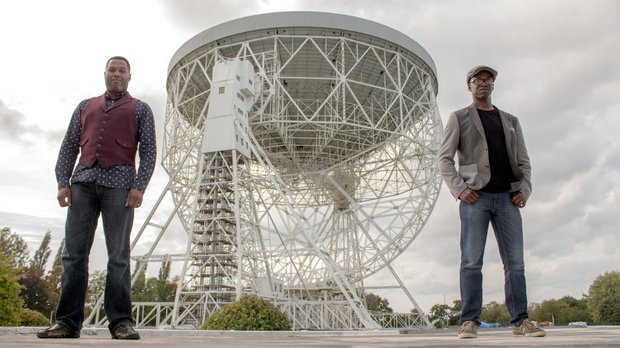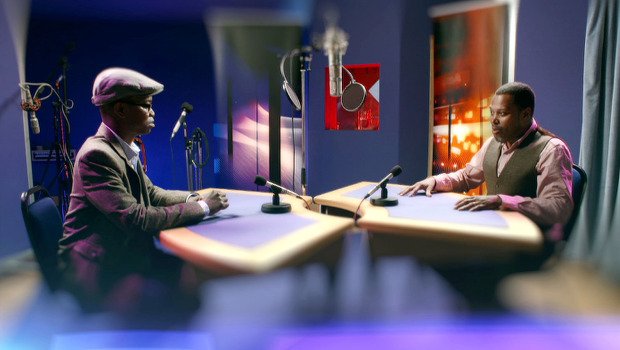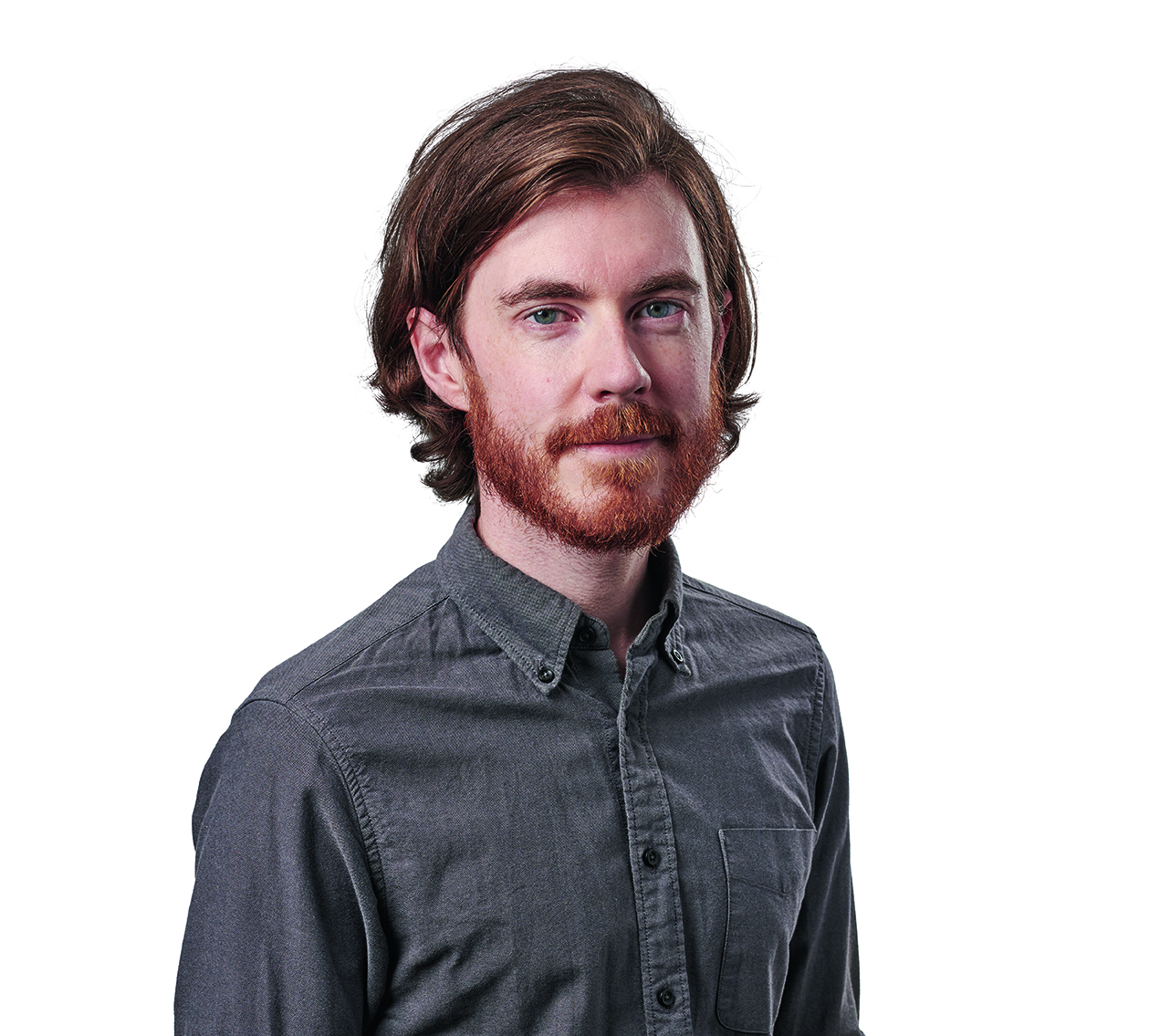Geek Syndicate Interview
The Geeks tell us about their new sci-fi documentaries for the Beeb

Today sees the launch of the BBC’s sci-fi season, with the four part documentary series Tomorrow’s Worlds on BBC Two at 9:45pm, and three iPlayer exclusive documentaries - available to view right now! Mark Gatiss narrates Stories From The Stars, featuring rarely-heard anecdotes from the stars of classic sci-fi films. Meanwhile, the Geek Syndicate’s dynamic duo Dave Monteith and Barry Nugent are your guides for Invasion Of The Fans and Days Of Fear And Wonder. We caught up with the Geeks to find out what their docs were all about.
SFX: How did you get involved with these two iPlayer documentaries?
Barry: It started with an email from John Das, who’s the producer, asking us if we’d be interested in taking part in this show that they were doing, which was the first show about fandom. I said, "yeah, that’d be fine". So he called me up and we had a bit of a conversation for an hour and a half and I think we were both feeling each other out. What I got a sense of talking to John was that he was a proper sci-fi fan. I didn’t know what to expect and it transpired that he’d found us because he’d listened to a couple of episodes of Geek Syndicate. Which for us was a massive surprise. It’s one thing knowing that people listen to your podcasts, but it’s another thing knowing that people from the BBC are listening as well, so maybe we shouldn’t have sworn quite so much, but there you go.
Dave: It’s quite interesting for us because it’s been eight years but we still haven’t got in our heads around the fact that more than 14 people listen. Andy [Hall], who’s the director, got in touch and said could he have a chat with us because they didn’t quite know what they wanted to do, but they wanted to feel us out. But that was fine. They came to London and they saw us for about an hour, and that was what he called a recce shoot, seeing what we were like together on camera, talking about what we loved. And the commissioners liked it, so it got the go ahead.
Barry: When they met with us it changed the focus somewhat. Originally they weren’t sure how they were gonna go and their first ideas was it was going to be the talking heads, talking to the fans all the way across and Dave and I were going to be one of the sets of fans they were going to talk to. But after they spoke to us they had the idea they could then frame the show, so when you see it they have all these amazing interviews with fans, and we’re like the frame that runs through it, which I believe wasn’t the original plan, but for us it was an amazing thing. We’d have been amazed just to have been involved in it anyway, but to be asked to host the show was an amazing experience for us both.
Do you think the mainstream are still largely unaware of sci-fi fandom?
Dave: I think they’re aware of it, but I think the Average Joe has an idea that is less than accurate. There’s an idea of the geek or the nerd that doesn’t always match with reality.
Get sneak previews, exclusive competitions and details of special events each month!
Barry: One of the good things when people see the show is, yes, it shows fandom in all its glory and the lengths people go to to support their fandom, but one of the things it does which some other shows that have looked at fandom didn’t is it makes the fans real people. You get their stories.
Dave: It’s not a piss take, actually. There are so many things we’ve seen that come over not always in a great way and ultimately whether it was the intention or not, a lot of things seem to take the mick a little bit, and this doesn’t do that. We were both a bit scared. I’ve got some experience in making documentaries, and even with the best will in the world someone else’s agenda can come through or things aren’t always shown in the best light and I think what’s really nice about this documentary is it takes people who at first appearance will inspire a reaction in some people which is like, “oh dear, here we go” and it makes them into real people.
Did you learn anything making Invasion Of The Fans?
Barry: In the journey that we’ve been on for Geek Syndicate I’ve learned to challenge my own – even as a geek myself – preconceptions of what I believed other geeks to be. Doing Geek Syndicate dispelled a lot of those myths. But once again, through doing the show, it dispelled some myths because the first time I watched it back straight away you were seeing… people. And sometimes you see people in costume and you start to paint their life story almost before they’ve even opened their mouth. When they open their mouth, and there are some amazing stories in there, you feel like you’re being taken on a bit of a journey with these people, which is lovely. For me I’ve learned that there is so much more that you can do when you push yourself. This was completely out of my comfort zone and we learned quite a lot from this experience, and we’ve also learned that you never know what’s around the corner. The one key ingredient about being a geek is dreaming and dreaming big. What’s been great for us is it’s a dream come true for us to be involved in something like that, so for me as a geek in my own life I’ve learnt not to give up on my own dreams because I know that these sorts of things are possible, and you start to see that in some of the stories that come out.
Dave: Despite being a geek and being on the receiving end of certain attitudes when I was growing up it was just a reality check that all is good, all is equal, all is permissible in geekdom. We started this eight years ago and it was a bit of a joke, a bit of a laugh, we didn’t really take it seriously. And anyone who knows us from back in the day will be shocked that we’ve got the ability to organise a weekly show. And we’re still here. We’ve put the hours in and I’m not saying we deserved to be on TV, but we put the hours in and we didn’t see this coming and one of the geek mantras is to dream big and plug away.
Were there any particularly surprising stories?
Dave: There’s a theme. Without giving things away one of the most beautiful things that came to me out of this documentary was seeing people who flourished out of really tragic circumstances. I was saluting at one point.
Barry: For me as well there was another story, and again it’s that thing of how being a geek and being into sci-fi can help you in dark times. If not dark times just overcoming your own circumstances. I identify with so many of those little bits where I could point and go, “well, that’s me.” I’ve had that moment. And I hope that’s what a lot of sci-fi fans will get from watching the show, is that they’ll be able to point to someone and go, that’s me, I understand that. One of the things I loved about it is there’s a little sequence where they talk about their reactions to sci-fi conventions. And some of their expressions are spot on my first expression the first time I went to a convention, my mind was completely blown. And I was pointing to that and going, “yep, that was me.”

The second documentary is all about the BFI’s Days Of Fear And Wonder Season. What’s impressed you the most about the season so far?
Dave: I think it’s the fact that it’s happening at all, that’s quite fantastic. I remember back in the day when you’d like sci-fi and your parents just assumed it was a phase that you would grow out of and a lot of your friends would think “grow up” or "you’re such a boy", stuff like that. And now the BFI – the cathedral of British cinema – is showing a sci-fi season in collaboration with places around the country. That alone is amazing. One of the first things we did was an outdoor screening of Flash Gordon at the British Museum. You’re sitting there with these massive colonnades behind you going, “This is such a strange juxtaposition, it’s fantastic!”
Barry: We’ve done quite a lot of personal things on this second one. When Dave and I first met Flash Gordon was the first science fiction film that we saw together. It was also first film that my parents allowed me to go and see on my own, without supervision. So for us going to see Flash Gordon was a special moment in doing this whole thing. It was the opportunity to not only meet, but talk to Mike Hodges, who was the director. But also to meet and attempt to interview Brian Blessed.
Dave: To quote Barry, it was like lassoing a hurricane. He was outrageous. We were just sitting there and thinking “we can’t use this footage!”
Barry: Good luck to the team who put that interview together. The bit we’ve just done at Jodrell Bank for 2001 was amazing. Absolutely amazing.
Dave: My favourite story that comes out of that is that we got to interview Tim O’Brien who’s an astrophysicist who works there, and he’s a big fan of Doctor Who and I asked him how do you rate Peter Capaldi. And with no trace of irony, and he wasn’t boasting or joking, as a matter of fact he said, “I’ve got it stacked up on iPlayer, but I haven’t had chance to watch it because I’ve been monitoring exploding galaxies.” That is the best sentence I’ve heard in my life.
Barry: He’s my new hero now.
Are you proud of how far sci-fi fandom has come?
Barry: To say I’m proud is an understatement. If someone had said to me when I was 12 years old “don’t worry, that’s cool”… I used to get called Joe 90 like it was a bad thing and I thought it was cool. People didn’t understand that he was a secret agent. If 45-year-old Barry could go back in time to 12-year-old Barry and say “don’t worry our time’s come”, I’d be like “you don’t know what you’re talking about you crazy old man.” And our time is here. Suddenly everyone’s sitting up and taking notice of sci-fi, and I think it’s great. It amazed me just how big the Days Of Fear And Wonder season is because I thought it was just, “ok, we’re going to have a couple of events around the country but mainly it’s going to be in London” but then when you actually go to the BFI site it’s the fact that you can put a postcode in and it will give you this stream of events that are going on in your area, I think it’s amazing. It’s the fact that everyone can take part, everyone can be involved around the country and that’s great, because so many of these things tend to be focused around London. I’m honoured that we’re a part of it and I hope that people enjoy what we’ve done and see that we are geek through and through. This is what we do, we’ve lived and breathed this since we were kids, so to get a chance to represent geekdom for iPlayer on the screen is great.
Dave: It’s quite an important thing for me because just over five months ago my wife and I had a baby that died the day of its birth. Mike Poole, one of the producer’s at iPlayer was really kind and put a credit for her in the first documentary, so the first credit that comes up has my daughter’s name on it. And for me to see that there and look at the doc and say “that’s a good place to see that name because I’m proud of what we did” means everything. If I wasn’t that proud of it maybe I’d ask to have it off because if you’re going to have my daughter’s name on it it’s got to represent a quality product as far as I’m concerned!
Barry: And also John, Andy and Chris, the BBC team involved, the trust that they’ve placed in us… because effectively we’re complete amateurs to this. We’re not Ant and Dec, we’re pretty much making this up as we go and the fact they’ve believed in us, every step of the way they’ve encouraged us is amazing. All through it they’ve said this is not about us taking the mick out of geeks. That’s been the one thing they’ve kept coming back to. And I think when people see the documentaries that will come across. That was the thing that came across to me, it’s a respectful show.
Invasion Of The Fans and Days Of Fear And Wonder are available to view on the iPlayer now.

I'm the Managing Editor, Entertainment here at GamesRadar+, overseeing the site's film and TV coverage. In a previous life as a print dinosaur, I was the Deputy Editor of Total Film magazine, and the news editor at SFX magazine. Fun fact: two of my favourite films released on the same day - Blade Runner and The Thing.


